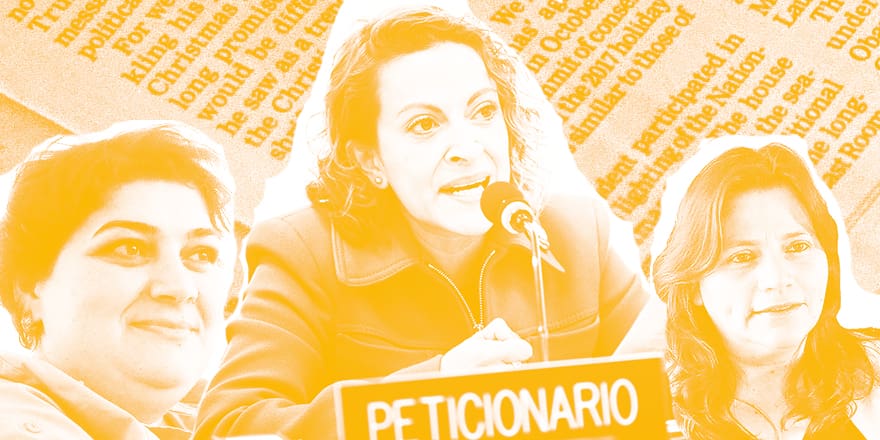On 25 May 2000, Jineth Bedoya Lima travelled to Colombia’s infamous Modelo prison, intending to follow up a lead. A investigative reporter, Bedoya had received information about arms sales between Colombia’s paramilitary groups and state officials. Before she could enter the prison, however, Bedoya was abducted at gunpoint. She was drugged, beaten and sexually assaulted before being tied up and dumped hundreds of kilometres away. This was done, she was told, to send a “message to the press”.
Fifteen years later, Bedoya’s case has become synonymous with the impunity that plagues Colombia’s justice system. While she has worked tirelessly – emerging as a leading advocate against sexual violence in Colombia – authorities have failed to carry out any effective investigation into the crimes against her or prosecute those responsible.
Bedoya’s story also exemplifies – to an extreme degree – the heightened risks faced by women journalists around the world. Far too often, women journalists are subjected violence, discrimination and harassment not endured by their male peers. Online violence has become both more prevalent and more coordinated – with women journalists subject to violent and sexual threats, as well as targeted harassment through doxing, stalking, or the non-consensual dissemination of intimidate images. Climates of impunity embolden perpetrators and fuel cycles of harassment and abuse.
Media Defence is committed to combating gender-based violence against women journalists. We pursue litigation that aims to ensure that states respond effectively to gendered violence, and that those responsible are held to account: In January 2019, we secured a key judgment before the European Court of Human Rights in the case of Khadija Ismayilova, an Azeri-investigative journalist subject to a systematic smear campaign and gross violations of privacy. We continue to work with investigative journalist Claudia Julieta Duque, subject to years of surveillance and harassment including threats of sexual violence against her and her daughter. We have supported legal action in Colombia’s domestic courts and before the Inter-American Commission on Human Rights, which focuses on the failure of authorities to intervene effectively in her case.
Most recently, in February 2021, we filed an amicus brief in a case brought by Jineth Bedoya against Colombia, currently pending before the Inter-American Court of Human Rights. As with Khadija Ismayilova and Claudia Duque, Bedoya’s case focuses once again on the failure of authorities to act in a context of gendered violence.
Time and again we see this pattern: where state inaction fuels a culture of impunity. It is essential that states recognise and respond to gendered violence – and ensure that laws protect women journalists both offline and on. On the occasion of International Women’s Day, we call on authorities to join us in our fight against gender-based violence against women journalists and hold perpetrators to account.
Read more about our work on online violence against journalists here.
If you are a journalist in need of support, please click here.
Recent News
Landmark Ruling: Kenya’s High Court Declares Colonial-era Subversion Laws Unconstitutional
Media Defence welcomes the verdict of the High Court in Nakuru, striking down sections of the Kenyan Penal Code which criminalise subversion, citing them as relics of colonial oppression that curtail freedom of expression. Justice Samwel Mohochi, delivering the judgment, asserted that these provisions were overly broad and vague, stifling dissent rather than serving any […]
UN Rapporteurs Call for Protection of Brazilian Journalist Schirlei Alves
UN Rapporteurs Call for Protection of Brazilian Journalist Schirlei Alves Amid Defamation Charges Stemming from Rape Trial Coverage A letter dispatched by UN rapporteurs to the Brazilian Government calls for protective measures for women journalists covering cases of sexual crimes. The letter also denounces the conviction of Brazilian investigative journalist and women’s rights defender, Schirlei […]
Convite à apresentação de candidaturas: Cirurgia de litígio em português na África Subsariana
Cirurgia de litígio em português na África Subsariana Aplique aqui 23 a 25 de julho de 2024 em Nairobi, Quénia Prazo: 3 de maio A Media Defence está a convidar advogados sediados na África Subsariana que falem português a candidatarem-se a participar numa próxima cirurgia de litígio sobre o direito à liberdade de expressão e […]



